




hen 10 Wisconsin municipalities banded together in 2000 to form a new municipal electric company known as Great Lakes Utilities (GLU) they understood joint action would not only deliver greater control over their power supply, but also strengthen reliability and support collaboration. GLU is marking a major milestone this October, as the joint action agency celebrates its 25th anniversary.

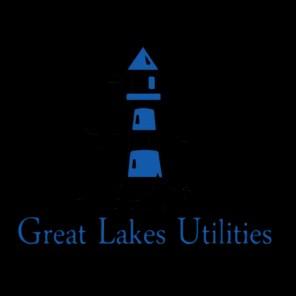
It’s Cybersecurity Awareness Month Page 3
MEUW News Monitor Page 4
Belmont is in the Community Spotlight Pages 8 -9
Classifieds Page 12
Today, GLU maintains a diverse portfolio of power supply resources, providing full-requirements service to nine of its 13 member communities Bangor, Clintonville, Cornell, Kiel, Medford, Shawano, Stratford, Trempealeau, and Wisconsin Rapids and partial-requirements service to Manitowoc. The remaining members Gresham, Marshfield, and Rice Lake receive various services, including power supply planning, MISO day-ahead and realtime generation market bidding, and capacity procurement. By pooling resources and working collaboratively, these communities have been able to secure affordable power, diversify their generation mix, and pursue new projects that would be challenging for individual utilities to undertake on their own. GLU’s aggregated load is approximately 400 MW and 2 million MWH.
In addition to power supply planning and forecasting, GLU also manages energy market participation and scheduling, retail rate case support, and other services on behalf of its members. GLU operations are managed by the staff at Marshfield Utilities.
“GLU ’s success is built on the strength of cooperation, ” saysNicolas Kumm, GLU ’s Managing Director.“The collaboration from our member utilities helps ensure our communities remain suc-
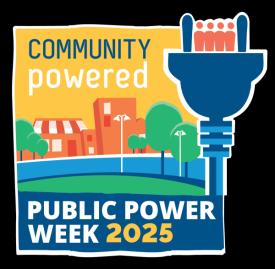
Each year, the first full week of October is set aside to recognize the people and qualities that contribute to the uniqueness of public power. Public Power Week 2025 is taking place Oct. 6–10, offering a chance to celebrate the many ways locally owned, not -
Continued on page 5
cessful today and into the future with reliable, affordable power supply. ” From addressing changing energy demands to planning for a cleaner, more resilient future, the organization has helped its members navigate an evolving industry while keeping the focus on local decisionmaking and community needs.
GLU is a municipal electric company operating as a public body and political subdivision of the state, with legal status separate from its member utilities. Its projectbased structure allows members to select projects and services of their choice.
GLU is one of three “joint action agencies” (JAAs) operating in Wisconsin. In 1978, MEUW was integral in passing legislation that led to the formation of the state’s first JAA, which today operates as Upper Midwest Municipal Energy Group (UMMEG). Another JAA WPPI Energy began operation in 1980. Sixtyfour of the 81 municipal utilities in the state have aligned themselves with a JAA. ⚫
For public power enthusiasts, the month of October is a time of celebration. The first full week of October is “Public Power Week” and a chance for folks from coast to coast to reflect on the special qualities that come with community ownership of their electric utility. Closer to home, October is the time we celebrate the founding of MEUW. As legend has it, in the weeks after a legislative hearing at the Capitol in Madison, a group of forward-looking community leaders recognized that municipal utilities needed a“stronger and more unified approach. ” They organized a meeting on Oct. 18, 1928, and laid the foundation for a new organization that would serve as the voice of public power in Wisconsin. While much has changed in the 97 years since, MEUW remains committed to maximizing the shared interests of municipal electric utilities. The currentBoard of Directors comprised of 19 utility leaders and 10 alternates representing municipal utilities large and small from all corners of the state are stewards of the original vision. In the past year, working groups of Board members have come together to strategize and develop plans to keep MEUW strong. The work of executing theStrategic Plan is an ongoing effort designed to build ownership among a new generation of public power advocates.
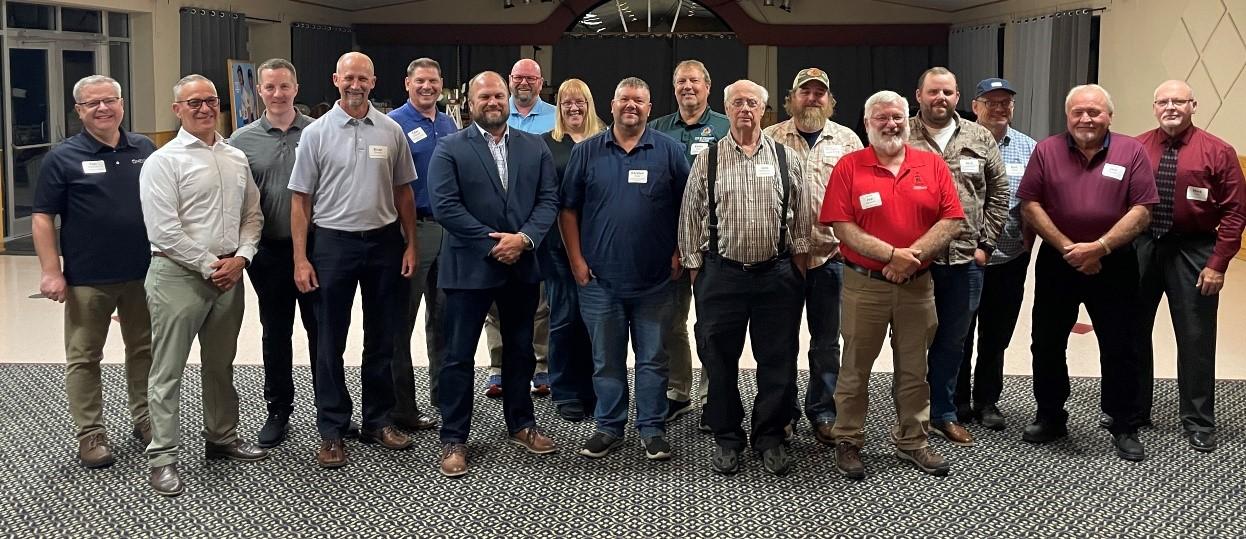
MEUW members representing the communities of Cedarburg, Columbus, Hartford, Juneau, Kaukauna, Lake Mills, Oconomowoc, Plymouth, Slinger, and Waupun joined MEUW President and CEO Tim Heinrich and Director of Legislative and Regulatory Relations Tyler Vorpagel for the first District Dinner of 2025. The gathering occurred in Hartford on Sept. 23 and continued a long -standing MEUW tradition of meeting for dinner, networking, and education about issues that matter to municipal utilities.
A total of eight dinners were organized this year. Registration is still open for three remaining dates Wednesday, Oct. 8, in Cashton; Thursday, Oct. 9, in Merrillan; and Wednesday, Oct. 15, in Mazomanie. VisitMEUW.orgfor details and to sign up for one of these free events.
Signs of success are visible as MEUW continues to enjoy a period of stability and unity. This newsletter is a prime symbol. The first edition ofLive Lines was published on Dec. 4, 1961, and we continue to use this important communications vehicle to engage our members. Beyond just the current happenings and industry trends,Live Lines is a valuable instrument in the municipal utility tool box. Our readership is varied from linemen and office staff, city and village leaders, local utility commissioners, to lawmakers and even utility customers the information we provide is designed to educate and inform.
Live Lines is also an important archive, chronicling history and serving as a reliable resource. One example is the periodic “Legal Report” that explains common topics affecting MEUW members. This month ’s column dedicates significant space to the nuances of public-bidding laws and how they impact unitprice contracts a subject many municipal utilities encounter. Thanks to MEUW ’s long-time partnership with the Boardman Clark law firm, this expert perspective highlights another example of MEUW’s long-term, tangible value.
Another regular column is the“Community Spotlight” a feature that takesLive Lines readers into the communities across Wisconsin where public power thrives. The journey began with the first article in August 2018, and we ’ve now made it through nearly all 81 cities and villages, offering a brief glimpse into what makes each one special. Through the years, I’ve heard from a lot of folks about how much they enjoy learning about each municipality. As we complete the profiles, I’m interested in your feedback about what we do once the story of every community has been written. Should we begin the journey again with a refresh of what ’s happening?
Live Lines is also a place for MEUW to showcase the best of public power. The strategy work being undertaken by the MEUW Board includes an emphasis on advocacy. We ’ve always used these pages to keep you updated on regulatory and legislative changes impacting munis. That won ’t change, but you can expect to see even more stories and ideas about how you can personally help advance the cause.
Having members who are engaged is a goal of every association like MEUW. We are fortunate that so many people care about what we ’re doing and understand the impact of their own personal involvement. As MEUW marks 97 years, we offer our heartfelt thanks for giving us so much to celebrate!

You can reach MEUW’s President and CEOTim Heinrich by email attheinrich@meuw.org or by phone at (608) 478-0998

Official monthly publication of Municipal Electric Utilities of Wisconsin, Inc. , the statewide trade association representing the interests of Wisconsin ’s public power providers since 1928.
This e-newsletter is distributed to more than 1,200 utility professionals and leaders throughout Wisconsin and the Midwest on the first Tuesday of every month.
LIVE LINES has been published continuously for many decades and provides useful information, news on emerging utility issues and legislation, updates on events, training programs and member services, as well as engaging feature stories spotlighting utilities, communities and leaders.
Reader comments and suggestions are welcome send by email to news@meuw.org
Tim Heinrich President and CEO
Mike Czuprynko Director of Safety Services and Operations
Tyler Vorpagel Director of Legislative and Regulatory Relations
Sharon Wolf Manager of Communications and Events
MEUW Office 725 Lois Drive Sun Prairie, WI 53590 (608) 837-2263
www.meuw.org

An archive of past issues of Live Lines is available at www.issuu.com/meuw
When U.S. Senator Tammy Baldwin (D-Wisconsin) visited Marshfield in late August, she met with local business leaders for a roundtable discussion at Marshfield Utilities (MU). The event was hosted in conjunction with Marshfield Area Chamber of Commerce to provide participants an opportunity to share how current and proposed legislation is impacting their businesses and the community at large.
Sen. Baldwin addressed several key issues, including the impact of proposed budget cuts on low-income families, tariffs, as well as her work on several congressional committees. MU General Manager Nicolas Kumm shared insights about topics affecting utilities, including:
◼ The need for permitting reform and timely approval processes;
◼ Maintaining a strong focus on electric reliability;
◼ Ensuring FEMA reimbursement for mutual aid efforts during disasters;
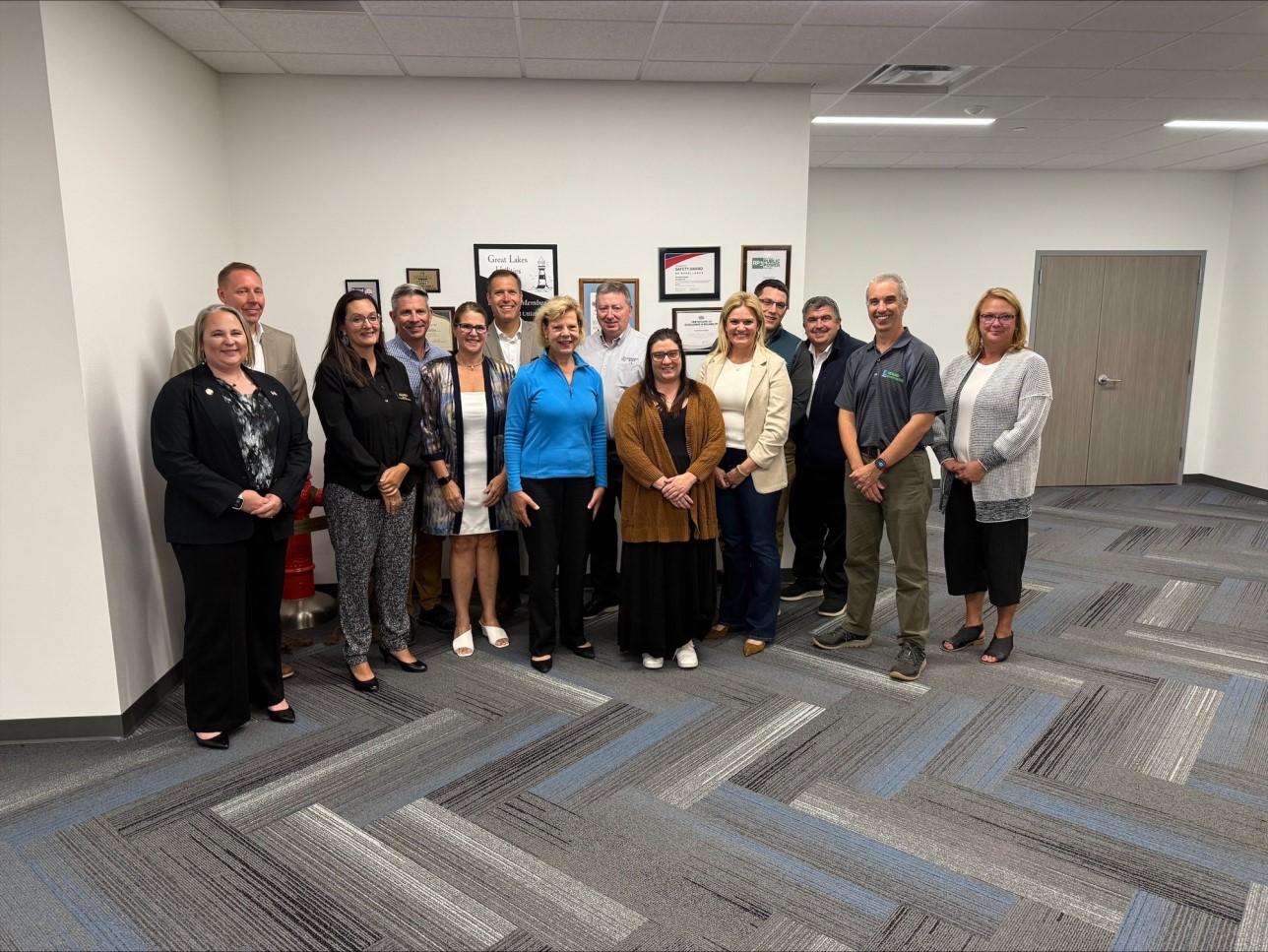
◼ Funding programs that help customers struggling to pay their utility bills;
◼ Holding polluters accountable for PFAS cleanup and disposal costs; and
◼ Securing resources to replace aging water infrastructure to help keep rates affordable.
This meeting highlighted the value of open dialogue among policymakers, businesses, and utilities to support reliable services, economic growth, and strong communities. ⚫
Imposter domains from fraudulent websites are designed to mimic legitimate businesses for the purpose of misleading users, stealing information, or carrying out unauthorized transactions. These lookalike sites often contain subtle misspellings, extra characters, or different domain extensions to appear authentic. Remember to:
◼ Double -check website URLs: Always verify that you are visiting an official website. Look closely at the spelling and structure of the domain name.
◼ Be wary of unexpected communications: If you receive suspicious emails or messages that prompt you to click on links or provide sensitive information, confirm their authenticity.

◼ Use bookmarks and trusted links: Access sites using saved bookmarks or links from official communications, rather than clicking on unsolicited links or links that come up when searching the web. Even a “sponsored” site can originate from imposters.
◼ Report suspicious activity: If you come across a website or receive a message that appears to impersonate another individual, notify them immediately.
Periodic and ongoing conflicts over service-territory boundaries prompted the MEUW Board of Directors to establish an ad hoc committee to explore opportunities for the association to play a more prominent role in exploring new solutions, including the possibility of a legislative fix. MEUW is hosting a Service Territory Symposium this month to educate members about the current laws surrounding utility service territories and to develop a deeper understanding of recent case studies impacting municipal utility boundaries. The members-only meeting is planned for Oct. 27 in Wisconsin Rapids and will include presentations about relevant state laws and Public Service Commission rules, as well as dialogue featuring sample territorial agreements and key cases. Additional details will be provided directly to utility leaders. Please direct questions to MEUW Director of Legislative and Regulatory Relations Tyler Vorpagel at (920) 265-7720.
MEUW ’s three-part Municipal Utility Leadership Certificate Program continues with another class later this year, “Leading with Consistency.”
This topic is being offered because consistency was identified as a critical competency for municipal utility leaders.
The one-day leadership development course focuses on why consistency is essential to being an effective utility leader. The training will be held Wednesday, Dec. 3, in Mauston. Participants will learn practical tactics they can apply to become a consistent leader and learn how consistency can inspire people to work toward a common goal. Click herefor details.
MEUW will once again offer an Underground Facility Locator Workshop in 2026. The workshop will be held April 1 in Spooner, and will cover information found in Units 1-3 of the National Utility Locating Contractors Association (NULCA) Professional Competency Standard including locating theory and use of the transmitter and receiver. The workshop will include both classroom instruction and hands-on practice locating, using a variety of techniques outside. All learners will receive a certificate documenting the training received. Mark your calendars registration will open early next year.⚫
In September, LRB-0693/4730 was circulated for cosponsorship from Sen. Pat Testin (R-Stevens Point) and Rep. Scott Krug (R -Rome) that would allow for third-party ownership and sale of solar energy in the state of Wisconsin. This is the third consecutive legislative session that a proposal like this has been introduced, and in each previous session, MEUW and others aligned with our interests have successfully prevented it from being enacted into law. While this particular bill applies only to investor-owned utilities, we continue to oppose these bills because once they are established, it would be easy to include other utilities in the future.

These community solar schemes are problematic because they erode the strong regulatory structure that we have worked so hard to achieve and that many see as an ideal model. This would require granting thirdparty developers access to our systems and require affected utilities to purchase power at rates that are often more costly. There are also many concerns about sales tactics used by these developers and the information they provide to our customers.
MEUW has joined with other utility associations and interested parties in sending aletterto legislators explaining why this would be a bad idea for Wisconsin and electric customers across the state. MEUW is continuing to meet with legislators to educate them on the issue and encourages MEUW members to do the same when they see their state senator or representative.

MEUW wants to celebrate our members! Live Lines already includes Member News aboutnew hires, promotions, retirements, honors, and awards. We want to share details aboutmarriages, births, and other important life milestones, too. Simply send an email tonews@meuw.org , so we canshare those tidbits in MEUW member communications.
Registration will open on Monday, Oct. 20, for the next Electric Operations Conference & Expo (EOCE26), which is happening in Wisconsin Dells early next year.
Annually, municipal and electric cooperative employees come together to network and learn about important topics impacting utility operations. MEUW and the Wisconsin Electric Cooperative Association (WECA) will hold EOCE26 at the Kalahari Resort on Jan. 14-15. Employees at all levels are welcome and encouraged to attend.
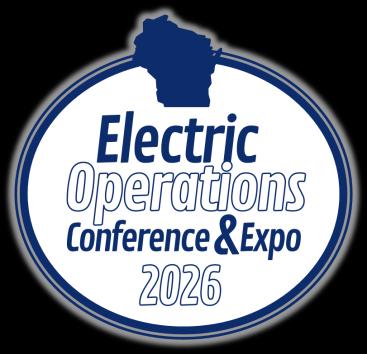

EOCE26 will feature presentations on topics of interest to municipal utilities as well as a large trade show with more than 100 utility suppliers showcasing the latest products and services for utility operations.
The keynote address will be delivered by renowned safety speaker, Brandon Schroeder. A journeyman electrician, Brandon’s journey as a safety speaker began in 2012, following a life-altering workplace accident that nearly claimed his life: He’ll explain how one decision to take a shortcut on the job changed everything.
Full details about the conference, including a list of sponsors and registration information, is availablehere.
Municipal utility employees from across Wisconsin gathered in September for MEUW’s annual Accounting and Customer Service Seminar . Each year, the event features an update from the Public Service Commission (PSC) with relevant and timely policy reminders. In preparation for this year’s appearance, MEUW asked PSC staff to include “tips” and insights about billing audits, rate-case filings, and handling customer complaints. The resulting presentation is a helpful resource that will benefit all municipal utilities. MEUW members interested in receiving the slides are encouraged to send an email to office@meuw.orgto request them.
Adam Schleicher , P.E., is the new Utilities Director for the City of Stoughton. Most recently, he worked for nine years as Director of Public Services for the City of Sun Prairie. His first day with Stoughton Utilities was Sept. 29. has joined Jefferson Utilities as Lead Lineman. He previously worked for Waterloo Utilities.
Kaukauna Utilities has hired two new employees:
◼ Jason Burton has joined as Journey Line Technician, and Alex Springhetti is a new Electrical Technician.
◼ In addition, Cooper Sanderfoot , a seasonal employee, accepted a full-time position as Junior Water Utility Technician.
Justin Hoffman has joined Menasha Utilities as a Project Engineer. He previously worked at Manitowoc Public Utilities.
Becky Neefe has joined Spooner Utilities as Utility Clerk. She will be training with and taking over for Penny Swan , who will be retiring in January.
for-profit utilities serve their customers and support their communities.
Public power utilities are committed to reliability, affordability, and local decision-making. Public Power Week highlights the work of the dedicated employees who keep the lights on and the essential role public power plays in driving economic growth, protecting the environment, and responding to community needs. (Check out the infographic on page 12).
Whether through community events, customer appreciation efforts, or educational outreach, Public Power Week is an opportunity to show how public power benefits everyone it serves. MEUW joins its members in thanking utility employees and celebrating the unique value of public power in Wisconsin and across the country.⚫


By Jared Walker Smith Boardman Clark
As public entities, municipalowned electric utilities are subject to Wisconsin ’s public bidding laws. (A“nuts-and-bolts” overview of these laws was published in theMarch 2024edition ofLive Lines ). A typical electric utility public construction project allows contractors to bid a set amount for the project. These projects have a detailed scope of work supported by specific plans and specifications, including expected quantities, locations for the work, and a final deadline. However, not all projects are so rigid throughout the course of a year utilities will be faced with unexpected construction needs, particularly overhead and underground distribution work. Some utilities have started implementing unit price contracts without a set (or even known) maximum quantity or location of work and which are intended to be in place for an extended period of time.
As more utilities consider whether to implement these “indefinite quantity ” unit price contracts, it is important to understand the unique issues these contracts raise related to Wisconsin’s public bidding and public construction laws. This article explores these issues and suggests what measures may mitigate compliance concerns. As always, this comes with an important caveat any utility contemplating an indefinite
quantity contract should consult with their local counsel before bidding.
Unit Price Contracts Under Wisconsin ’s Public Bidding Law. To start, unit price contracts are impliedly authorized under Wisconsin’s public bidding law, with such contracts having been affirmed by the Wisconsin Supreme Court in Probst v. City of Menasha , 245 Wis. 90, 13 N.W.2d 504 (1944), in Thomsen-Abbott Const. Co. v. City of Wausau , 9 Wis. 2d 225, 100 N.W.2d 921 (1960), and again inGottschalk Bros., Inc. v. City of Wausau , 56 Wis. 2d 848, 203 N.W.2d 140 (1973).While subsequent cases make clear that there is a fine line between a unit price contract and a contract utilizing unit prices to determine the total contract price, a well drafted unit price contract should hold up to scrutiny. When it comes to awarding a contract to the lowest responsible bidder, in the simplest unit price contract, the lowest bidder is the bidder with the lowest price per unit. This analysis gets harder where a single contract contemplates multiple unit prices. This issue may be surmountable where total quantities have been reasonably estimated, but utilities should provide a clear understanding to bidders on how the lowest bid will be determined.
Indefinite Quantity Contracts. An “indefinite quantity contract” (IQC) is a unit price contract that typically has no upper limit on the number of units which may be procured during the term of the contract. Where there are multiple unit prices in a single contract and quantities of each type of
unit are unknown, evaluating the lowest bidder becomes a much more fraught calculus. Importantly, IQCs cannot be so open-ended as to allow a buyer to purchase no units during the term. This could render the entire contract void as a matter of law. For such an agreement to be enforceable, a buyer must be obligated to purchase a minimum quantity of units Without a minimum quantity requirement, such contracts typically fail for lack of consideration on the part of the buyer.
One of the main issues with IQCs is that Wisconsin ’s public bidding laws generally presume that the total cost of a project, when bid, is known for determining the responsibilities of the bidder and the owner.
Wisconsin Statute § 62.15(3) requires that bids be accompanied by a certified check or a bid bond equal to at least 5% and not more than 10% of the bid. This provision provides for liquidated damages for the utility should an accepted bidder fail to sign the contract and provide surety for performance of the contract.
The total value of the contract also determines: what level of surety will be required; what level of penalty any required bond must carry; and what provisions the construction contract must include regarding the duties of the prime contractor and the ability of the owner to pay subcontractors.See Wis. Stat. §§ 779.14(1e), (1m)(d), and (1m)(e).
These issues carry beyond the formation of the contract and bidding. During the performance of the work, a utility is
obligated to grant a contractor: [A]n estimate of the amount and proportionate value of the work done, which entitles the contractor to receive the amount of the estimate, less the retainage, from the proper fund. The retainage shall be an amount equal to not more than 5 percent of the estimateuntil 50 percent of the work has been completed . Wis. Stat. § 66. 0901(9)(b) (emphasis added).
After 50% of the work has been completed, partial payments must be made in full and no additional retainage is permitted except under specific circumstances.Id.
However, under an indefinite quantity contract, the total cost of a project is open-ended leading to potential issues with implementing these statutory requirements e.g., how long musta utility retain 5% and at what pointmustthe utility stop retaining 5%?
Addressing Issues with IQCs. Without additional court guidance, the following are only suggestions on how a utility may set up an IQC to address the issues described above. A utility should consult with local counsel during project planning to determine if any of these suggestions will work for the utility’s proposed project.
Contract Terms.An IQC could include all statutorily required contract terms for any value contract. For example, IQCs would require contractors to pay all claims related to the project, maintain a list of all subcontractors, suppliers, and service providers, authorize the utility to make directpayments
to subcontractors or issue checks payable to the contractor and the subcontractor(s),and require payment and performance bonds rather than any authorized alternative assurance.Wis. Stat. § 779.14(1e)(a) & (b), & (1m)(d)1.a., 2.a., & 3.
Alternatively, the terms could be based on the guaranteed minimum quantity required to make the contract enforceable, a reasonable estimate of the total quantity expected, or an established maximum quantity that the utility can purchase under the contract. The first two options risk having statutorily non-compliant or less protective terms should the utility purchase more than the minimum quantity or estimate. And a guaranteed maximum quantity potentially limits the flexibility of having an indefinite quantity contract.
lish the quantities and total cost for each sub-project. Bonding terms would be based on the sub-project total cost and payment estimates and retainage could be reasonably estimated based on the percentage of the sub-project that has been completed.

An alternative would be to have bonding and payment based on the guaranteed minimum quantity, reasonable estimate, or established maximum quantity options discussed above. These options carry the risk of under or over protecting the utility, impacting the price of the bid, or arguable noncompliance with statutory retainage requirements (over or under retaining).
for the bid bond. If the guaranteed minimum quantity is based on a known portion of the project, the initial task order could be executed concurrently with the master agreement. The risk remains that the execution and provision of sureties for additional task orders will not be secured by the retention of the bid bond.
at the time of bid could lead to costly change orders if actual site conditions differ from the general assumptions set out in the plans and specs. While this is always good advice, utilities should use extra caution when working with their engineers on the preparation of plans and specifications and their attorney on a contract that protects the utility in these situations.
Payment and Performance Bondingand Retainage . Both a required payment and performance bond and the ability of the utility to retain amounts from completed work raise similar issues they are based on the total cost of the project, which by the nature of an indefinite quantity contract is unknown until the contract term ends.
One approach that has been utilized (but not reviewed by any court) is using a master agreement that establishes the unit price for bidding purposes, but which contemplates the parties entering into individual task orders for each identified sub-project. Task orders entered into during the term of the master agreement would then estab-
Bid Bonds. Bid bonds face similar issues to payment and performance bonds. The amount of the bid bond is based on the total bid cost. Solutions similar to those proposed above could be implemented.
An issue not addressed by utilizing task orders is that a utility must return the certified check or release the bid bond upon the contractor ’s execution of the contract and provision of the required sureties. Under the task order setup, the master agreement is signed upon bid acceptance, but the required sureties are provided on a task order basis. This requires either a longer retention of the bid bond or a return of the bid bond prior to the provision of a payment and performance bond. Utilities could consider utilizing the guaranteed minimum quantity to establish the amount and retention period
Contract Length . Just as Wisconsin law is silent on IQCs, it is also silent on what is a reasonable term for such contracts. Outside of market restrictions (a contractor may be hesitant to be tied to a unit price for an extended period of time in today ’s supply chain world), utilities should consider that Wisconsin ’s public bidding laws are there“to prevent fraud, collusion, favoritism and improvidence in the administration of public business, as well as to insure that the public receives the best work or supplies at the most reasonable price practicable.” Aqua-Tech, Inc. v. Como Lake Protection & Rehabilitation District, 71 Wis. 2d 541, 550, 239 N.W.2d 25 (1976). Utilities should keep these considerations in mind when determining how often the utility should be going back out to bid on an IQC whether annually, biannually, or other time frame.
Plans and Specifications and Change Orders . A contractor is entitled to rely upon the express representations in the plans and specifications prepared by a utility in preparing and submitting its bid, even where the contract places a duty of investigation upon the contractor. An IQC where the exact locations and quantities of the work may be unknown
It may be helpful to have different contracts for different types of projects. A utility may also wish to reserve the right to separately bid out any particularly complicated project that could otherwise be covered under the scope of the IQC.
PSC Construction Authorization
A utility should also never forget the requirements in Wis. Stat. § 196.49 to obtain a certification or approval of the PSC before beginning a project. A utility should consider how it will define its proposed project for the purposes of determining whether the project qualifies for an exemption from obtaining PSC authorization based on the “estimated gross cost of the project ” under Wis. Stat. § 196.49(5g).
Conclusion .IQCs may provide additional flexibility for electric utilities. Regardless, these contracts should be used only after due consideration of all potential issues, consultation with local counsel, and careful crafting of bidding documents and plans and specifications.⚫

Jared Walker Smith is an attorney with Boardman Clark law firm in Madison. He is currently serving as Chair of the Public Utilities Section of the State Bar of Wisconsin.

By Karen Whitmer
Located in Lafayette County in southwestern Wisconsin, Belmont may be small just under a 1,000 residents but it plays a big role in the state ’s history. In 1836, the village briefly served as the first capital of the Wisconsin Territory, helping the region establish a government, pass laws, and prepare for statehood. By the time Wisconsin became the 30th state in 1848, the capital had already moved to Madison. However, the First Capitol Historic Site in Belmont preserves that early chapter and continues to attract visitors interested in the state’s beginnings.
While Belmont’s history is notable, the village is now defined by its people and strong sense of community. That pride is reflected in Belmont Municipal Light and Water, which provides its residents with reliable, affordable electric, water, and wastewater service while supporting local growth and development.
pal Light and Water manages electric, water, and wastewater services for the community. To handle larger projects, the utility often joins forces with neighboring municipal utilities. Crews from across southwest Wisconsin frequently work alongside Belmont’s staff, especially during storm restoration or major upgrades.
“These utilities team up for more than emergencies they collaborate on big projects too,” said Mike Czuprynko, MEUW ’s Director of Safety Services and Operations.“Sharing people, tools, and know-how helps them accomplish more for their
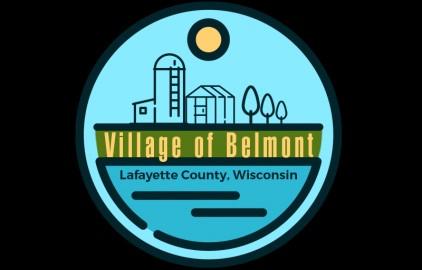
“Belmont is proud of its history, but we’re even more proud of the strong community we have today,” said Julie Abing, Belmont ’s Clerk -Treasurer. “Our municipal utility is here to support that, making sure we have the services and connections we need to grow together. ”
The role of Belmont ’s municipal utility Belmont Municipal Light and Water is at the heart of the village ’s progress. According to Abing, the utility serves about 580 electric customers, including 490 residential accounts, while also supporting Belmont’s largest customer, Lactalis. The French-based multinational, one of the world ’s largest dairy companies, operates 13 facilities in the United States including two in Wisconsin. The Belmont plant produces feta cheese, a product with rising demand across the United States. To keep pace, Lactalis continues to invest in upgrades and expanded production at the facility, which is also the utility ’s largest electric customer.

“Lactalis not only supplies high-quality cheese, but the Belmont plant also provides jobs and economic support, making it a cornerstone of the local economy,” said Abing.
With just four employees including lineman Mike Wedig Belmont Munici-
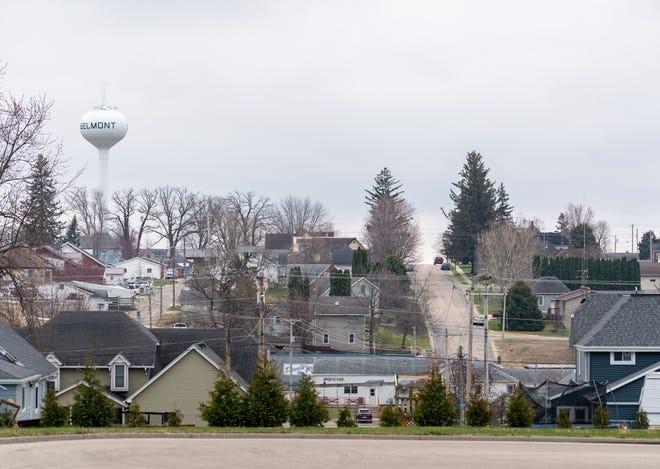
Village revitalization and community growth
Incorporated in 1894, Belmont takes its name from the French phrasebeau mont, or “beautiful mountain.” Today the village works to attract new businesses and residents while keeping that small-town beauty intact.

Additional residential development is also expected in the future. The Liberty Ridge Subdivision, located across from the school on the northeast side of the village, has created new housing opportunities for families. To support development, Belmont created a Tax Increment District (TID) that reinvests future property tax revenue from the district into developers ’ incentives.“Both the subdivision and the TID are investments in Belmont’s future,” Abing said. “They help attract new families while easing the burden on current taxpayers.”
Belmont is also committed to making sure growth is matched with a good quality of life. Bond Park offers a playground, walking trail, and picnic shelter; Leahy Park includes basketball, tennis, and pickleball courts; and Trail Side Park, the newest addition, provides a gathering spot for trail riders and community events.
Continued on page 9
Continued from page 8
Though the capital moved to Madison long ago, Belmont still attracts history enthusiasts to the First Capitol Historic Site, located just outside the village and operated by the Wisconsin Historical Society.
Visitors also come for Belmont’s annual events, which showcase community spirit and pride. Each September, the Belmont School & Community Fair Wisconsin ’s oldest free fair
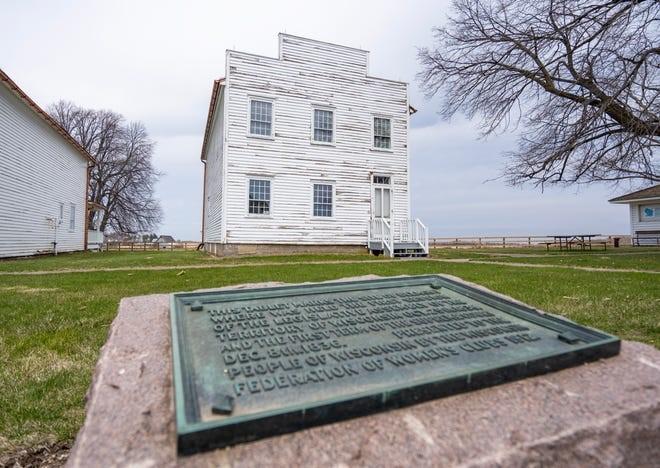
a commemorative tablet marks the first session of the legislative assembly that occurred on Oct. 25, 1836.
Did you know? The claim that Belmont which was the site of 46 days of meetings in 1836 to lay the groundwork for state government is the first capital of Wisconsin is a bit misleading. The community was originally chosen as the center of a territory that at the time included present-day Iowa, Minnesota and parts of Illinois and the Dakotas. During that first meeting, lawmakers chose Madison as home to the territory’s Capitol Building.
brings residents and visitors together for livestock shows, horse competitions, a parade, and a variety of family friendly activities. The day after Thanksgiving, the village is home to the Turkey Trot 5K, a festive run and walk along scenic streets that allows participants to burn off holiday treats while supporting local projects.
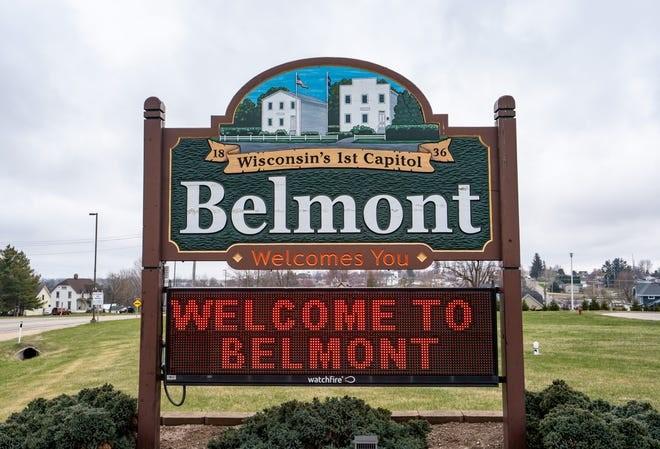
Both the Turkey Trot and other seasonal initiatives are supported by Belmont Forward, a community-focused organization that also leads beautification projects. Belmont Tourism Commission sponsors the Belmont Holiday Trail, encouraging festive lights and decorations throughout Bond Park and the village. These events and programs reflect the friendliness and energy that define Belmont today.
Although Belmont may be best known for its place in Wisconsin’s history, the village today is defined by the services, projects, and traditions that drive it forward. With reliable utilities, strong community ties, and steady investment in growth, Belmont continues to be a place where residents can thrive.
“We have a special community,” Abing said. “We have an interesting past, but more importantly, we have a vibrant future. We are a community that loves their family, friends, and neighbors, and are willing to help others when the need arises. All of us at Belmont Municipal Light and Water are proud to serve our community.” ⚫
Karen Whitmer is a regular contributor toLIVE LINES;she is a freelance communicator based in the Fox Valley. Many of the photos accompanying this article are from reporting in theMilwaukee Journal Sentinel.
The association’s marquee training programs will once again be offered in 2026. Two series “Fundamentals of Utility Management” and the three-part “Municipal Utility Leadership Program ” are designed to expand municipal workers’ skillsets. Each of the day-long training classes is available to employees of all skill levels and is especially suited for those new to public power or those who aspire to leadership roles at their utility. As always, veteran employees interested in a refresher on the topics are encouraged to attend as well.
Course offerings and planned dates for 2026 are as follows:
Feb. 11 Utility Accounting and Finance
Apr. 2 Leading Through Collaboration
June 3 Regulation, Compliance & Safety
Aug. 5 Leading with Consistency
Oct. 7
Dec. 2
Utility Planning & Risk Management
Leading Through Coaching
All training will take place in person in Mauston. Full details about the topics covered is availablehere ⚫

Rep. Piwowarczyk is new to representing 98th District
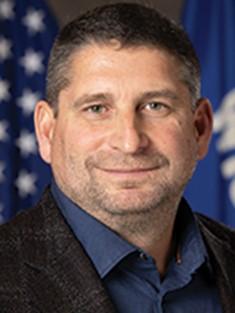
Jim Piwowarczyk (RHubertus) took office in January 2025 as the State Assembly representative for Wisconsin ’s 98th District. The 98th Assembly District covers parts of Washington and Waukesha counties in southeastern Wisconsin. It includes the city of Hartford and the villages of Merton, Sussex, and Lannon. One of his first assignments was becoming Vice Chair of the Assembly’s Criminal Justice and Public Safety Committee a role he ’s embraced given his years in law enforcement. He also sits on the Colleges and Universities, Housing and Real Estate, State Affairs, State and Federal Relations, and Sporting Heritage committees. In addition, he was chosen to lead the Speaker ’s Task Force on Government Efficiency and Modernization, where he ’s working on ways to update how state government uses technology, including artificial intelligence. Piwowarczyk grew up in Kewaskum and graduated from Kewaskum High School. He later earned a degree in police science from Moraine Park
Technical College and studied justice administration at Marian University. In 1994, he joined the Glendale Police Department, where he served for more than 20 years, rising to the rank of sergeant. He also worked part-time as an officer for the Kewaskum Police Department.
After retiring from police work, Piwowarczyk moved into business and entrepreneurship. He built and ran several Snap Fitness gyms in southeastern Wisconsin, eventually growing to five locations before selling the business in 2020. He also launched Realty Solutions Group, a real estate firm, and co-founded Wisconsin Right Now, a conservative news site that reflects his long-standing interest in current events and public policy.
Outside of work, Piwowarczyk has always been active coaching youth sports ranging from basketball and football to snowboard racing. He and his wife, Susan, live in the Town of Erin and have three children.
Rep. Tranel

Travis Tranel (R-Cuba City) has served in the State Assembly since 2011, representing the 49th District. Located in southwestern Wisconsin, the district covers all of Crawford County and most of Grant County, including the cities of Boscobel,
MEUW is organizing an“Advocacy101”webinar to share insights about the legislative process and explain how everyday people can use their voices to influence lawmakers.
In this interactive session, MEUW will break down the basics in a simple, practical way. Participants will take away:
◼ What advocacy is (and how it’s different from lobbying);
◼ Why advocacy matters to our communities, industry;
◼ An understanding about the key decision-makers, who they are and how they shape policy; and
◼ Ideas to share your story and get your message across.
The webinar will also include a short practice exercise to try out an“elevator pitch ” and share tips for having conversations with lawmakers.
No experience is required just bring your curiosity and a willingness to give it a try. By the end, you ’ll walk away with a few simple tools and a better understanding of how everyday people can make a real difference. Watch for details!
Fennimore, Lancaster, Platteville, and Prairie du Chien.
Now in his seventh term, Tranel plays a key role in shaping policy as a member of the Assembly Committee on Energy and Utilities. He also serves as Chair of the Assembly Committee on Agriculture, guiding policies that support Wisconsin farmers, and sits on committees addressing insurance and commerce.
Born in Dubuque, Iowa, Tranel grew up on his family ’s dairy farm in southern Grant County and graduated from Wahlert Catholic High School. He earned a degree in economics and finance from Loras College, where he developed the analytical and financial skills that would later help him manage his own farming and business ventures.
After college, Tranel returned
home to build his career in agriculture and business. He manages Tranel Farms USA, Inc., his family’s multigenerational dairy operation, working to modernize the business and adapt to the evolving dairy market. He also co-founded Fleege Tranel, LLC, a partnership that broadened his involvement in agribusiness and gave him deeper insight into the financial and operational challenges faced by family farms.
Beyond his legislative work, Tranel remains active in community life through the Knights of Columbus, his parish council, the Farm Bureau, and the Platteville Regional Chamber of Commerce. He and his wife, Stephanie, live in Cuba City with their five children, where he continues to balance farming, family, and public service.⚫
The Elkhorn Area School District (EASD) is setting a strong example for how Wisconsin schools can reduce utility costs and improve building performance through strategic energy efficiency initiatives. With guidance and support from Focus on Energy in partnership with Elkhorn Light & Water, EASD is implementing a series of upgrades and assessments that are already delivering measurable savings, making it a model for other districts and municipal utilities across the state.
EASD ’s journey began in 2022 with several foundational projects, including a boiler upgrade at the elementary school, a lighting retrofit at the high school, and a solar photovoltaic installation. These early efforts laid the groundwork for deeper energy-saving strategies. In late 2023, Nick Datka joined EASD as Buildings & Grounds Supervisor and immediately partnered with Focus on Energy to leverage a federal Energy CLASS Prize grant. This grant, awarded by the U.S. Department of Energy, supports schools in reducing energy use and training staff in energy management.
One of the district ’s key steps was benchmarking energy use across its buildings. Focus on Energy helped EASD collect and analyze utility data, starting with Elkhorn Middle School, which had historically high energy bills. The school ’s ENERGY STAR® Portfolio Manager® score of 37 out of 100 confirmed the need for improvement. In April 2024, Focus on Energy conducted a comprehensive energy assessment of the building,

identifying two major issues: high-efficiency boilers running unnecessarily at full power and malfunctioning Variable Air Volume (VAV) box controllers causing fans to overwork.

EASD responded quickly. By August 2024, boiler settings were adjusted to reduce gas usage during the heating season, and plans were made to replace the broken VAV controllers. These targeted actions, supported by Focus on Energy incentives, are already paying off. The district is now saving an estimated 6,837 therms of natural gas and 269,121 kWh of electricity annually. These savings translate to 478,367 pounds of CO ₂ emissions avoided and $39,398.25 in yearly utility cost reductions. Additionally, EASD earned over $40,000 in financial incentives from Focus on Energy.
EASD ’s success story highlights the value of municipal utilities ’ proactive collaboration with Focus on Energy. By encouraging local schools to engage with energy advisors, utilities can help their communities unlock significant savings, reduce environmental impact, and reinvest in educational environments. These efforts not only lower operating costs but also foster long-term sustainability and resilience.
As EASD demonstrates, even modest upgrades and operational changes can yield substantial benefits when paired with expert guidance and financial support. To learn more about how your utility can support local schools in their energy efficiency journey, visitFocus on Energy’s education resources. ⚫




MEUW is pleased to promote job openings with its member utilities across Wisconsin. New positions are regularly added to our website check them out here or use your smartphone to scan the QR code below Here are some current opportunities available:
Cuba City Light & Water Journeyman Lineman
Kaukauna Utilities Relief System Operator
Village of New Glarus Utilities Supervisor
City of Boscobel City Engineer/Director of Public Works
Brodhead Water & Light Journey Electric Lineworker
When your utility is hiring, be sure to email the job posting to office@meuw.org





3,349 $0.00
Median population of the 81 communities that operate their own electric utility.
315,515
Merrillan is the smallest with about 550 residents and Sun Prairie is the largest with a population of 38,387.
Number of homes and businesses that receive power from a community-owned utility. The total population of those communities is about 507,000.
Profit earned on $674.6 million in electric sales revenue by the state ’s community-owned utilities in 2024. Public power utilities are not-for-profit.
11
Percentage of state ’s electricity distributed by municipal utilities

Thank you to our advertisers: MEUW appreciates the support of companies choosing to invest in municipal utilities by sponsoring events and advertising in the association ’s newsletter, membership directory, and website. Their support enables MEUW to offer reasonable registration fees to members. If you’d like to learn more, please call the MEUW Office at (608) 837-2263 or visitmeuw.org/sponsor.⚫


